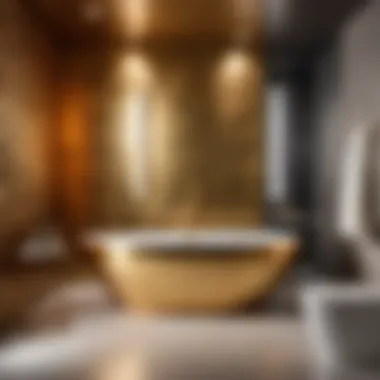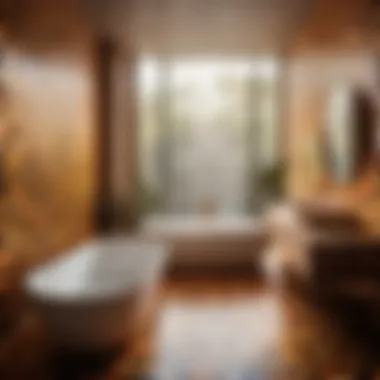Unlocking the Full Potential of Epoxy Paint for Bathrooms: A Complete Guide


Materials:
- Epoxy paint kit (1 gallon)
- Primer (1 quart)
- Paint roller
- Paintbrush
- Stir sticks
- Measuring cup
- Painter's tape
- Drop cloths
- Protective gloves
- Respirator mask
DIY Steps:
- Preparation: Clean the bathroom walls and floor thoroughly to remove any dirt or grease. Ensure the surface is dry before proceeding.
- Priming: Apply a coat of primer using a paint roller, starting from the top and working your way down. Let it dry as per the manufacturer's instructions.
- Mixing Epoxy Paint: Follow the instructions on the epoxy paint kit to mix the resin and hardener properly. Stir the mixture thoroughly until it reaches a uniform color.
- Application: Using a paint roller, apply the first coat of epoxy paint in smooth, even strokes. Allow it to dry according to the recommended drying time.
- Second Coat: Apply a second coat of epoxy paint for added durability and a seamless finish. Ensure proper ventilation during the drying process.
Technical Aspects:
- Tools: Ensure you have all the necessary tools such as a paint roller, paintbrush, stir sticks, etc., to facilitate a smooth application process.
- Timing: Be mindful of the drying times recommended on the paint and primer containers to achieve optimal results.
- Techniques: Adopt a crisscross pattern when applying epoxy paint to ensure thorough coverage and a professional finish.
DIY Project Process:
- Installation Method: Start from one corner of the bathroom and work your way across, paying attention to even application and avoiding drips.
- Key Techniques and Timings: Keep a wet edge to prevent lap marks and maintain a consistent finish throughout the application process.
- Troubleshooting Tips: In case of drips or uneven coverage, lightly sand the affected area once dried and reapply a thin coat to rectify the issue.
Introduction
In the realm of home improvement, selecting the right type of paint for your bathroom is crucial in achieving both functionality and aesthetics. Among the various options available, epoxy paint stands out as a versatile and durable choice, offering a range of benefits that cater to the specific requirements of bathroom environments. From its exceptional water resistance properties to its remarkable longevity and aesthetic appeal, epoxy paint emerges as a top contender for those seeking to elevate their bathroom spaces. This comprehensive guide delves into the nuances of using epoxy paint in bathrooms, covering essential aspects such as application techniques, maintenance protocols, and key considerations to empower homeowners and professionals alike in making informed decisions.
Understanding Epoxy Paint
Epoxy paint is a specialized coating that consists of epoxy resins and a hardener, forming a highly resilient and protective surface when applied to various substrates, including bathroom walls and floors. What sets epoxy paint apart is its chemical structure, which results in a strong, resistant finish that can withstand moisture, chemicals, and regular wear and tear inherent in bathroom settings. This unique composition makes epoxy paint an ideal choice for surfaces that require enhanced durability and long-lasting performance.
Scope of the Article
This article offers a comprehensive exploration of the benefits, application methods, maintenance guidelines, and considerations associated with using epoxy paint in bathrooms. By delving into the intricacies of each aspect, readers will gain a holistic understanding of how epoxy paint can transform their bathroom spaces. Whether you are a DIY enthusiast embarking on a home renovation project or a seasoned professional seeking to enhance bathroom aesthetics, this guide equips you with valuable insights to navigate the process effectively.


Benefits of Epoxy Paint in Bathrooms
In this article, we delve into the significant advantages that epoxy paint offers for bathrooms, shedding light on why it has become a popular choice for homeowners and professionals alike. Epoxy paint stands out due to its exceptional durability, water resistance, and aesthetic appeal, making it a versatile solution for bathroom surfaces. Understanding the benefits of epoxy paint is crucial for anyone looking to enhance their bathroom's functionality and visual appeal.
Water Resistance
Water resistance is a key attribute of epoxy paint that sets it apart from traditional paint options. The chemical composition of epoxy creates a waterproof barrier once applied, making it ideal for wet environments like bathrooms. This feature prevents water damage, mold growth, and ensures a longer lifespan for the painted surfaces. With epoxy paint, you can maintain a clean and pristine bathroom space without worrying about water-related issues.
Durability and Longevity
One of the most notable benefits of epoxy paint in bathrooms is its remarkable durability and longevity. Epoxy coatings form a tough, protective layer over surfaces, offering resistance to scratches, stains, and impacts. This strength ensures that your bathroom walls and floors stay in pristine condition for years to come, reducing the need for frequent touch-ups or replacements. Investing in epoxy paint translates to long-term savings and a maintenance-free solution for your bathroom.
Aesthetic Appeal
Beyond its functional benefits, epoxy paint excels in enhancing the aesthetic appeal of bathroom surfaces. Available in a wide range of colors and finishes, epoxy allows for endless design possibilities to suit your style preferences. Whether you prefer a sleek, modern look or a more classic feel, epoxy paint can transform your bathroom into a visually stunning space. Additionally, epoxy coatings bring a glossy sheen to surfaces, elevating the overall ambiance and increasing the perceived value of your property. With epoxy paint, you can achieve a sophisticated and luxurious bathroom aesthetic that leaves a lasting impression on guests and residents alike.
Preparation for Epoxy Painting
In the quest to maximize the benefits of epoxy paint in bathroom spaces, thorough preparation is key to achieving long-lasting results. This section delves into the crucial aspects of preparing for epoxy painting, ensuring a flawless application and superior performance in the bathroom environment.
Surface Cleaning and Repair
Before embarking on an epoxy painting project, thorough surface cleaning and repair are essential steps to guarantee a smooth and durable finish. Dirt, grime, grease, and existing paint must be completely removed to create a clean canvas for the epoxy application. Any imperfections such as cracks, holes, or dents should be carefully repaired to prevent them from affecting the final outcome. Proper surface preparation not only enhances the adhesion of epoxy paint but also promotes a visually appealing and professional result.
Primer Application
The application of a high-quality primer is a critical component of the epoxy painting process in bathrooms. Primer serves as a bond between the surface and the epoxy paint, ensuring optimal adhesion and longevity. It helps to seal the surface, prevent moisture intrusion, and enhance the color vibrancy of the epoxy topcoat. Choosing the right primer based on the surface material and condition is essential for the success of the project. Proper primer application guarantees a strong foundation for the epoxy paint, leading to enhanced durability and a flawless finish.


Ventilation and Safety Measures
Ventilation and safety considerations play a vital role in the epoxy painting process, particularly in confined spaces like bathrooms. Adequate ventilation is necessary to ensure proper air circulation and the dissipation of fumes emitted during painting. Implementing safety measures such as wearing protective gear, using respirators, and working in well-ventilated areas are imperative to safeguard both the individuals involved in the project and the indoor air quality. Prioritizing ventilation and safety precautions enhances the overall experience of epoxy painting and minimizes potential health risks associated with the application process.
Application of Epoxy Paint
Epoxy paint application is a crucial aspect of maximizing the benefits of this versatile material in bathroom settings. It plays a significant role in not just enhancing the visual appeal of the space but also ensuring longevity and durability. The meticulous application of epoxy paint is essential for achieving a flawless finish that can withstand the moisture and everyday wear and tear typical of bathrooms.
Tools and Materials Required
To embark on a successful epoxy paint application journey in your bathroom, you need to gather a specific set of tools and materials. These include high-quality epoxy paint suited for moisture-prone environments, primer suitable for the chosen surface, brushes or rollers for application, painter's tape for precision, sandpaper for surface preparation, protective gear like gloves and goggles, adequate ventilation for a safe working environment, and a clean and dust-free workspace to ensure a smooth application process.
Step-by-Step Painting Process
Before delving into the actual painting process, it's crucial to prepare the bathroom surface adequately. This involves cleaning the area thoroughly, repairing any visible damages, and applying the primer as a base coat. Once the surface is prepped, the epoxy paint can be applied evenly using the chosen tools, following the manufacturer's instructions for drying times and coats. It's essential to work systematically from one corner to another, ensuring seamless coverage and avoiding overlap marks.
Tips for Achieving a Smooth Finish
Achieving a smooth finish with epoxy paint requires attention to detail and proper technique. To guarantee a flawless outcome, make sure to mix the epoxy paint thoroughly before application, maintain a consistent thickness throughout, work in small sections to prevent the paint from drying too quickly, and pay special attention to corners and edges for uniform coverage. Additionally, ensure proper ventilation during and after painting to facilitate drying and minimize odors, leading to a professional-looking finish that enhances the overall aesthetic of your bathroom.
Maintaining Epoxy Painted Surfaces
In this section, we delve into the crucial aspect of maintaining epoxy painted surfaces within your bathroom. Ensuring the longevity and appeal of your epoxy painted bathroom walls and surfaces is essential for preserving the investment made in this innovative painting solution. By implementing a regular maintenance routine, you can uphold the quality and aesthetic of the epoxy paint, enhancing the overall look and feel of your bathroom space.
Cleaning and Regular Maintenance
To uphold the pristine condition of your epoxy painted bathroom surfaces, regular cleaning and maintenance are paramount. Utilize mild, non-abrasive cleaners to wipe down the walls and surfaces periodically. Avoid harsh chemicals that can damage the epoxy finish, opting instead for gentle cleaning solutions that are compatible with epoxy paint. By incorporating a simple cleaning regimen into your weekly routine, you can prevent the buildup of dirt, grime, and moisture that may compromise the integrity of the epoxy paint.


Handling Repairs and Touch-Ups
Over time, wear and tear may necessitate minor repairs and touch-ups on your epoxy painted surfaces. Have a touch-up kit readily available to address any scratches, chips, or blemishes that may occur. Follow the manufacturer's guidelines for mixing and applying touch-up paint to ensure seamless blending with the existing epoxy surface. By promptly addressing any imperfections, you can preserve the overall aesthetic continuity of your bathroom walls and surfaces.
Avoiding Common Pitfalls
When maintaining epoxy painted surfaces in your bathroom, it is essential to avoid common pitfalls that may compromise the durability and appearance of the paint. Steer clear of abrasive cleaning tools and rough scrubbing motions that can scratch the epoxy finish. Additionally, be cautious with sharp objects that may gouge or puncture the paint. By adopting gentle cleaning practices and handling your bathroom surfaces with care, you can prevent unnecessary damage and prolong the lifespan of your epoxy paint investment.
Considerations and Limitations
Epoxy paint offers numerous benefits for bathroom surfaces, but there are important considerations and limitations to keep in mind when using this material. Understanding these factors is crucial for ensuring the success and longevity of your bathroom renovation project.
Moisture Levels and Environment
Moisture levels and the bathroom environment play a significant role in the performance of epoxy paint. Bathrooms are high-moisture areas, which can impact the adherence and durability of epoxy coatings. It is essential to ensure that the surface is properly dried and that the humidity levels are within the recommended range before applying epoxy paint. Failure to address moisture issues can lead to peeling, bubbling, or discoloration of the paint, compromising the overall aesthetic and longevity of the finish.
Compatibility with Different Surfaces
Another crucial aspect to consider is the compatibility of epoxy paint with various surfaces commonly found in bathrooms. Epoxy paint may adhere well to some surfaces such as tiles, concrete, or metal, but it may not bond effectively with others like wood or plastic. It is essential to assess the type of surface you intend to paint and choose an epoxy formula specifically designed for optimal adhesion to that material. Thorough surface preparation, including cleaning and priming, is essential to ensure a strong bond between the paint and the substrate, enhancing the longevity and performance of the epoxy finish.
Cost Analysis and ROI
When considering epoxy paint for bathroom applications, it is essential to evaluate the cost-benefit ratio and return on investment. While epoxy paint tends to be more expensive than traditional paints, its long-term durability and resistance to moisture and chemicals can result in cost savings over time. By investing in high-quality epoxy products and professional installation, homeowners can enjoy a low-maintenance and aesthetically pleasing bathroom surface that withstands daily wear and tear. Conducting a thorough cost analysis and considering the long-term benefits of using epoxy paint can help homeowners make informed decisions that align with their budget and renovation goals.
Conclusion
In the realm of maximizing the benefits of epoxy paint in bathroom settings, the concluding section of this comprehensive guide plays a pivotal role in encapsulating the essence and significance of this versatile painting solution. Throughout this article, we have delved into various facets surrounding epoxy paint usage in bathrooms, from its application methods to maintenance tips and considerations for optimal outcomes. As we draw towards the wrap-up, it is imperative to underscore the crucial aspects touched upon and emphasize their importance in the broader context of bathroom improvement projects.
One of the fundamental elements to consider in this conclusion is the transformative impact of epoxy paint on bathroom aesthetics and durability. By choosing epoxy paint as your go-to option for bathroom surfaces, you are essentially investing in not just visual appeal but also long-term resilience against water damages and wear-and-tear. The ability of epoxy paint to withstand high moisture levels and frequent cleaning routines elevates its position as a premier choice for modern bathrooms seeking a balance of style and substance.
Furthermore, this conclusion highlights the practical benefits offered by epoxy paint, such as its seamless application process and relatively low maintenance requirements compared to traditional paint solutions. By embracing epoxy paint, homeowners and professionals alike can unlock a plethora of advantages that contribute to a hassle-free and aesthetically pleasing bathroom environment.
Additionally, the conclusion addresses key considerations worth pondering before embarking on an epoxy paint project in bathrooms. Factors like moisture levels, surface compatibility, and cost analysis are essential in ensuring that the chosen epoxy paint strategy aligns with the specific needs and constraints of the space in question. Understanding these considerations not only enhances the planning phase but also sets the stage for a successful and rewarding painting venture.
In essence, the conclusion serves as a consolidated reflection of the journey through this guide, encapsulating the essential takeaways and serving as a springboard for informed decision-making in the realm of epoxy paint application in bathrooms. By heeding the insights provided in this article, readers can embark on their epoxy paint ventures with confidence, knowing that they are equipped with the knowledge needed to attain exceptional results in both functionality and aesthetics.







